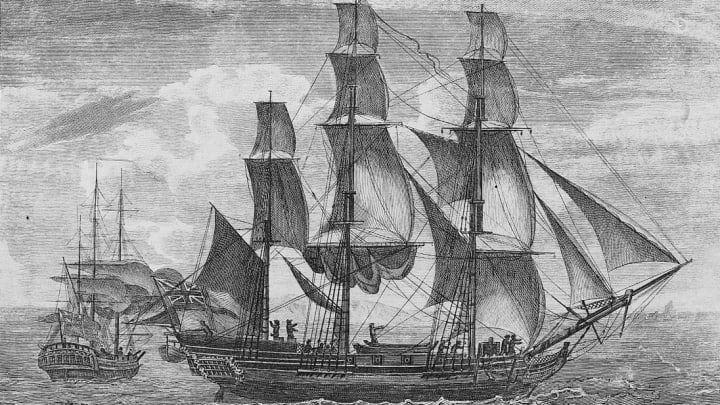The exact location of the final resting place of Captain James Cook’s HMS Endeavour, which was sunk off the coast of Rhode Island 200 years ago, is considered one of maritime history’s greatest mysteries. Now, after a 25-year effort to pinpoint its remains among 13 sunken vessels, The Age reports that the Endeavour might have finally been identified.
British explorer James Cook left England on the Endeavour in 1768 headed for the South Pacific. He and his crew became the first European expedition to map the entire coast of New Zealand, and later, the first to reach Australia’s east coast. Along the way, they collected hundreds of previously unknown plant species, became the first Europeans to record a kangaroo sighting, and gathered evidence that would help disprove the existence of the long-speculated southern continent, Terra Australis, that hypothetically extended all the way up to the equator.

After that three-year journey, Cook and his crew returned to England. Though Cook became a legend, the Endeavour didn’t receive the star treatment. The British Royal Navy used it to ferry supplies to and from the Falkland Islands for several years before selling it to a private buyer. The ship was renamed the Lord Sandwich, and was eventually put into service transporting German mercenaries to fight on Britain's side in the American Revolution.
That’s how the ship ended up in Rhode Island, where it was stationed as part of the Royal Navy’s fleet in Newport Harbor and used as a prison ship for captured American soldiers. When French reinforcements came to assist American revolutionaries in Rhode Island, the British decided to sink their ships rather than allow them to be captured, creating a blockade out of scuttled vessels to block the French from getting into the harbor. They sank 12 transport vessels and set another on fire. Over the ensuing years, locals and French forces took equipment from the wrecks, but it’s never been entirely clear what happened to the remains.
The Rhode Island Marine Archaeology Project began to try to map and identify those remains starting in the early 1990s, and eventually figured out that the Lord Sandwich was the same ship as the HMS Endeavour. As the ship played a vital role in Australian history, the Australian National Maritime Museum then got involved with the project.
The two organizations have announced that they have lowered the number of potential wrecks that could be the Endeavour from 14 to five—and perhaps down to just one—by inspecting the area and measuring the wrecks against historic information about Cook's vessel. The researchers think the final resting place of the ship is located off the coast of Goat Island in Narragansett Bay, but to be absolutely certain, they’ll have to excavate the remains of the ship and examine its timbers. The researchers hope to have that work done by the 250th anniversary of Cook’s arrival in Australia’s Botany Bay—and his claiming of Australia as British territory—in 2020.
And there may be a battle over the remains. While the ship is considered a vital artifact of Australian history, the state of Rhode Island claimed ownership of all of the sunken ships in 1999, and they are overseen by the Rhode Island Historical Preservation and Heritage Commission.
[h/t The Age]
